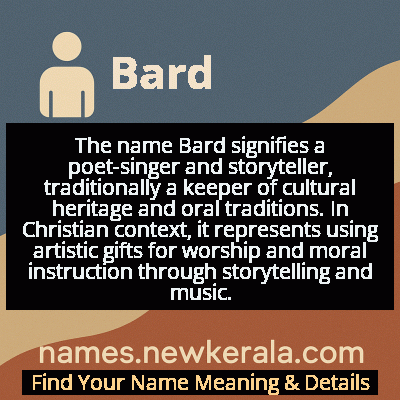Bard Name Meaning & Details
Origin, Popularity, Numerology Analysis & Name Meaning of Bard
Discover the origin, meaning, and cultural significance of the name BARD. Delve into its historical roots and explore the lasting impact it has had on communities and traditions.
Name
Bard
Gender
Male
Origin
Christian
Lucky Number
7
Meaning of the Name - Bard
The name Bard signifies a poet-singer and storyteller, traditionally a keeper of cultural heritage and oral traditions. In Christian context, it represents using artistic gifts for worship and moral instruction through storytelling and music.
Bard - Complete Numerology Analysis
Your Numerology Number
Based on Pythagorean Numerology System
Ruling Planet
Neptune (Ketu)
Positive Nature
Intuitive, analytical, spiritual, and inquisitive.
Negative Traits
Secretive, reserved, aloof, and can be overly critical.
Lucky Colours
Green, yellow.
Lucky Days
Monday.
Lucky Stones
Cat’s eye, moonstone.
Harmony Numbers
1, 5, 6.
Best Suited Professions
Scientists, researchers, spiritual leaders, detectives.
What People Like About You
Depth of knowledge, analytical skills, spirituality.
Famous People Named Bard
Bard the Bowman
Legendary Warrior
Slayer of the dragon Smaug in J.R.R. Tolkien's Middle-earth legend
Bard of Armagh
Irish Poet
Last of the ancient Irish bards, preserved Gaelic poetic traditions
Bard Thompson
Theologian
Influential Christian liturgist and author of 'Liturgies of the Western Church'
Bard Breivik
Musician
Norwegian folk musician preserving Scandinavian musical traditions
Name Variations & International Equivalents
Click on blue names to explore their detailed meanings. Gray names with will be available soon.
Cultural & Historical Significance
In Christian contexts, the name Bard evolved to represent the idea of using artistic gifts for divine worship and moral instruction. Medieval Christian bards often composed religious poetry and hymns, bridging pagan traditions with Christian worship. The name symbolizes the transmission of faith through artistic expression, embodying the concept that storytelling and music can serve as vehicles for spiritual enlightenment and community building across generations.
The name also reflects the Christian value of using one's talents in service of higher purposes, with the bardic tradition adapting to include biblical storytelling and hymn composition. This Christian adaptation maintained the bard's role as cultural preserver while redirecting that preservation toward Christian narratives and values.
Extended Personality Analysis
Individuals named Bard typically exhibit strong creative and communicative abilities, often possessing natural charisma and emotional intelligence. They tend to be articulate storytellers who can captivate audiences with their words and presence. Bards are frequently described as intuitive and empathetic, with an innate understanding of human nature that allows them to connect deeply with others. Their creative nature often manifests in multiple artistic pursuits, whether through music, writing, or performance.
Bards are often natural leaders who inspire others through their vision and eloquence rather than through authority or force. They value tradition and cultural heritage while also embracing innovation in artistic expression. While they can be introspective and thoughtful, they also possess a social nature that draws people to them. Their personality combines the wisdom of a historian with the spontaneity of an artist, making them both reliable custodians of tradition and exciting innovators in their chosen fields.
These individuals often demonstrate remarkable adaptability, able to navigate different social contexts with grace and understanding. They tend to be peacemakers who use their communication skills to resolve conflicts and build consensus. The name suggests someone who carries themselves with a quiet confidence, understanding the power of words and stories to shape reality and influence hearts.
Modern Usage & Popularity
In contemporary naming practices, Bard remains relatively uncommon but carries significant appeal for parents seeking names with historical depth and literary connections. The name has experienced a modest resurgence in recent decades, particularly following popular culture appearances in works like Tolkien's 'The Hobbit.' It maintains strongest usage in Scandinavian countries, especially Norway, where it's considered a traditional name. In English-speaking countries, Bard is chosen by parents who appreciate its artistic connotations and Celtic heritage, often by families with musical or literary backgrounds. The name's rarity makes it distinctive without being unfamiliar, and it fits well with current trends favoring short, strong names with meaningful histories. Modern Bards often find their name serves as an interesting conversation piece and reflects their parents' values regarding cultural preservation and artistic expression.
Symbolic & Spiritual Meanings
Symbolically, the name Bard represents the eternal human need for storytelling and cultural transmission. It embodies the archetype of the voice that carries wisdom across generations, serving as society's living memory and moral compass. The name signifies the transformative power of artistic expression to shape understanding, heal wounds, and bridge divides between people and eras. In metaphorical terms, a Bard serves as a conduit between individual experience and collective consciousness, transforming personal stories into universal truths.
The name also carries Christian symbolic meaning as representing the use of God-given talents for divine purpose and community edification. It symbolizes how artistic gifts can become vehicles for spiritual expression and moral instruction, turning entertainment into enlightenment. The Bard archetype represents the sacred responsibility of preserving truth through beauty and the power of narrative to reveal deeper spiritual realities.

